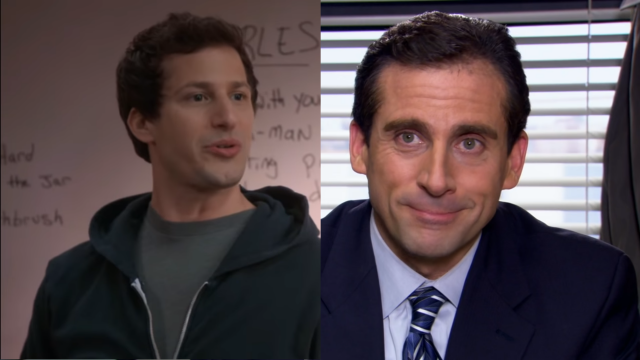Normally, these double features aren’t literally putting the two stories into competition, just comparing and contrasting two similar things, but in this case, I absolutely prefer The Office to Brooklyn 99, and I think I know exactly why. Both shows are workplace sitcoms with very similar attitudes, following the adventures of a bunch of people with distinct personalities who all work in the same job – paper sales in the former, police work in the latter – and tracking their emotions and quirks in farcical plots. In its third season, The Office shakes up the status quo slightly by having the Stamford group merge with our Scranton protagonists, bringing Ed Helms as Andy from a glorified cameo that existed purely as antagonist to Jim to a secondary character. I was quite surprised how much I liked Helms as Andy, because I was used to seeing him play protagonists (or antagonists) in movies where his particular style of acting and comedy was the centre of gravity to the whole work. The Office made me like him by making him part of an ensemble; his acting style is unique on the show, and Andy has his own motivations distinct from everyone else, which makes him an actual character. It is, of course, interesting in the ways I personally find interesting – he has all of the neediness of the protagonist, Michael, but none of his interest in people just for their own sake, which makes him a commentary on the strengths and weaknesses of Michael and an interesting commentary on a very American type-A personality in his own right. But it’s also just, you know, funny – he creates unique jokes on his own, and allows other characters to generate jokes in response to him, like Jim’s goodnatured exasperation or Michael’s attempts to join in. By comparison, B99 grinds my gears because to me, it’s just the same damn joke over and over.
Obviously I’m exaggerating, but whenever I sit and watch it (or, more often, watch scenes while scrolling through Facebook), it feels like every joke has the exact same cadence and rhythm – like a game of Mad Libs where each character’s particular Quirk was inserted into the gaps (“Hey, Gary who fucks a walrus, smell this milk.” / “Wow, that sure smells like the walrus I fuck!” / “I feel like I should have expected that.”). It was in contemplating Andy that I locked onto the problem I was having: all the actors use the exact same style of acting! They’re all using tics, quirks, expressions, and gestures to underline their statements, with each actor using their own personal set of tics over and over. Contrast with that wide range of styles we see on The Office; Steve Carell comes closest to doing to doing what the cast of B99 do, using a variety of tics and gestures, but he uses them expertly, bouncing his energy around the room to convey his character’s sweaty desperation, and more importantly, he’s the only one who acts like that. John Krasinski and Jenna Fischer approach their characters with an understated naturalism and empathy, feeding off the other actors and directing that back outward. Rainn Wilson feels like the anti-Carell to me – there’s a rock-solid steadiness to him, where chaos and emotion around him is casually deflected off. To put it another way, Carell bounces his energy around the room, while Wilson directs all his energy into the task right in front of him.
Both shows get where they are from the scripts, too. The really interesting thing about the mockumentary format of The Office was how necessary it was, especially in the wake of imitators and shoot-offs like Parks & Recreations. It’s a genuine TV-friendly way to show the inner life of characters and how strongly it conflicts with the face they present to the world – think of all the great Ryan The Temp jokes, where he puts up one face to the office and lets us in on his genuine exasperation and horror at what he’s seeing. In the case of Michael, it lets us see that he doesn’t actually have an inner life – he’s almost clinically incapable of stopping to think something through, often ending up spouting chains of interrelated thoughts, and he ends up revealing a lot more about himself and his way of thinking than he realises, and that happens specifically because he has an audience who are literally paid to just sit there and listen to him talk as long as he wants. It occurred to me that a lot of B99 scenes work under the exact logic of a Michael monologue, with the only difference being that there are other characters in the scene. It’s like the character’s goals in each scene are to Be Quirky or Make Observations About Each Other’s Quirkiness, as opposed to The Office, where the characters had real, specific goals that happened to reveal their quirkiness.

